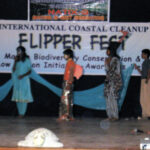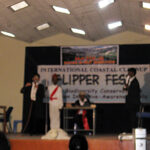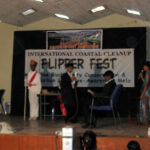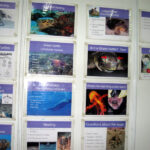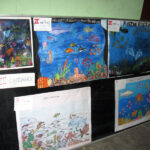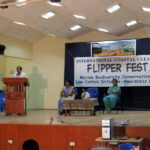Blue, fins, water. What picture do these words create in your mind? Something related to the sea, perhaps?
If you had gone to the Kumararani Meena Muthaia School and College, Adyar on 4th and 5th August, 2011, you would have been greeted by two huge Olive Ridley turtles made of curved sticks with a painted jute cloth spread over it.
Wondering what they were there for? Yes, the Flipper Fest 2011 organised by the TREE (Trust for Environment Education) Foundation along with Roots ‘n’ Shoots India was conducted at the college premises this year.
Flipper Fest, started in 2007, is an annual event which acts as a prelude to the International Coastal Cleanup Day that is observed every year on the third Saturday of September. This Fest is all about marine ecosystem, marine biodiversity and the threats to it and the various conservative measures underway. This year 47 schools and 6 colleges participated.
The first day of the Fest witnessed the poster making and essay writing competitions and a quiz. Topics and themes for all events were related to marine biodiversity.
The quiz contained various interesting questions such as ‘What do deep-sea organisms make use of for communication?’ the answer for which is ‘Bio-luminescence’ (it is the production and emission of light by a living organism). Another question, the answer to which shocked the participants, was ‘Which is the largest marine mammal found off the Chennai coast?’
The answer was Blue Whale (the largest known animal to have ever existed on this earth) which is found about 20 nautical miles off the coast of Chennai!
Click on the thumbnails to view larger imagesThe presentation and ecodrama competitions were held on the second day. This was followed by the valedictory function, for which the Chief Guest was Mr. A.S.Balanathan, IFS, Chief Conservator of Forests, Tamil Nadu Forest Department.
Dr. Supraja Dharini, the founder of TREE Foundation, who opened the valedictory address, said “Our actions on land make an impact on the ocean”. She talked about how humans have increased the amount of stress levels on the inter-tidal zone areas, that is, the beaches. She also said researchers have found that the amount of plastic fragments on the seabed is six times more than the amount of phytoplankton, which form the basis of the oceanic food chain.
The Chief Guest’s A.S. Balanathan, IFS, spoke about the various challenges that a person faces when trying to work for conservation and protection of nature. He said, “Being in the top position, I can say it’s not easy. It’s a great challenge. There are so many adverse conditions and situations”.
The much awaited prize distribution followed next. The prize winners, from various schools and colleges received certificates, books, DVDs and cash prizes.
The children went back home with much needed knowledge- an important tool in conserving our unique marine ecosystem in its pristine glory.


